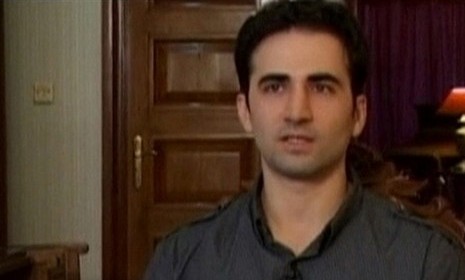Will Iran execute an American citizen?
Iran has sentenced former U.S. Marine Amir Hekmati to death for allegedly being a CIA spy bent on brainwashing Iranians through video games

A free daily email with the biggest news stories of the day – and the best features from TheWeek.com
You are now subscribed
Your newsletter sign-up was successful
On Monday, an Iranian court sentenced U.S.-born Amir Mirzaei Hekmati to death for espionage, among other charges. Hekmati, 28, is a former U.S. Marine and dual Iranian-U.S. citizen — Iran considers him only Iranian — who Tehran accuses of spying for the CIA after getting special training at a U.S. base in Afghanistan. Hekmati's family in Michigan insists he was just in Iran visiting his grandmother, and the U.S. denies that he is a spy of any sort. Hekmati has 20 days to appeal his sentence, but given the rising tensions over Iran's enrichment of uranium and tough new U.S. sanctions, might Iran actually execute an American citizen? Here's what you should know:
What exactly is Hekmati charged with?
"Cooperating with the hostile country America and spying for the CIA," trying to gin up evidence of Iranian terrorism, and spreading propaganda, says judiciary spokesman Gholamhossein Mohseni-Ejei. The Iranian court calls Hekmati mohareb, an Islamic legal word suggesting he "waged war against God," and mofsed, referring to someone who "spreads corruption on Earth." He is the first American that Iran has sentenced to death for spying, according to Reuters. In a televised "confession," Hekmati says he worked for New York video game maker Kuma Games, which he said was a "cover for the CIA" that made propagandistic pro-U.S. games designed to brainwash Mideast youth.
The Week
Escape your echo chamber. Get the facts behind the news, plus analysis from multiple perspectives.

Sign up for The Week's Free Newsletters
From our morning news briefing to a weekly Good News Newsletter, get the best of The Week delivered directly to your inbox.
From our morning news briefing to a weekly Good News Newsletter, get the best of The Week delivered directly to your inbox.
Does the CIA really make propaganda video games?
"If so, the projects are top secret," says Will Oremus at Slate. It's possible that the CIA or other U.S. spy agencies are financing video games to "win over the hearts and minds of our enemies," but Kuma's "pro-American" first-person shooters "have the feel of an attempt to capitalize on recent headlines more than a concerted propaganda effort." A CIA video game aimed at fomenting rebellion in Iran would be less violent and more geared toward realistic decision-making, experts say, perhaps trying to persuade gamers of "the pitfalls of Islamism or the value of participating in a democratic opposition movement." The whole plot "seems highly unlikely," to say the least, says Rick Moran at American Thinker. "I think the Iranians watch too many western spy movies."
Is Hekmati a U.S. spy or not?
His confession is suspect, and the U.S. is adamant that he's not a spook, says Stephen Totilo at Kotaku. But according to U.S. records, "Hekmati did indeed work for Kuma," and the Pentagon did give Kuma $96,000 for Hekmati to create a language-learning program. "We have no way of knowing if Mirzaei was working with our intelligence agencies or not, and frankly that's really not the public's business," says Jazz Shaw at Hot Air. It's enough to know that he's an American who served in uniform. "Nobody knows the truth about the Hekmati case," says John Glaser at Antiwar. But remember, when you read about "the Evil Iranian Menace sentencing to death a former U.S. Marine," at least Iran is letting him appeal his sentence. The same isn't true of sometimes-innocent Guantanamo prisoners jailed by "the Benevolent Obama Administration."
A free daily email with the biggest news stories of the day – and the best features from TheWeek.com
Will Iran really execute him?
"There's very little chance that the Iranians would actually be stupid enough to carry out this sentence," says Hot Air's Shaw. This seems like a fairly typical outburst of "grandstanding" and "flexing their muscle against 'the Great Satan.'" Iran is "desperate for any leverage it can get vis-à-vis the United States," Iran analyst Karim Sadjadpour tells The Washington Post. So it's "highly unlikely" they'll execute such an important "bargaining chip." But with tensions so hot, we shouldn't expect "any more 'humanitarian gestures'" like Iran used to free three U.S. hikers last year, says American Thinker's Moran. So the question is, what does Iran want for Hekmati's release? Sadly, "it is probable the price for Mirzaei's freedom will be too high for the U.S. government to pay."
Sources: American Thinker, Antiwar, Hot Air, Kokatu, Reuters, Slate, New York Times, VentureBeat, Washington Post
-
 The ‘ravenous’ demand for Cornish minerals
The ‘ravenous’ demand for Cornish mineralsUnder the Radar Growing need for critical minerals to power tech has intensified ‘appetite’ for lithium, which could be a ‘huge boon’ for local economy
-
 Why are election experts taking Trump’s midterm threats seriously?
Why are election experts taking Trump’s midterm threats seriously?IN THE SPOTLIGHT As the president muses about polling place deployments and a centralized electoral system aimed at one-party control, lawmakers are taking this administration at its word
-
 ‘Restaurateurs have become millionaires’
‘Restaurateurs have become millionaires’Instant Opinion Opinion, comment and editorials of the day